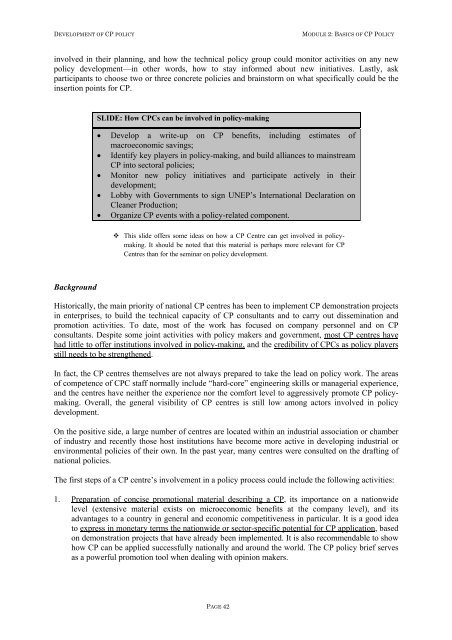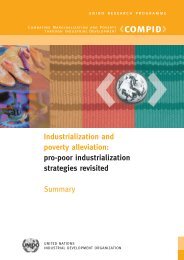Manual on the Development of Cleaner Production Policies ... - Unido
Manual on the Development of Cleaner Production Policies ... - Unido
Manual on the Development of Cleaner Production Policies ... - Unido
You also want an ePaper? Increase the reach of your titles
YUMPU automatically turns print PDFs into web optimized ePapers that Google loves.
DEVELOPMENT OF CP POLICY<br />
MODULE 2: BASICS OF CP POLICY<br />
involved in <strong>the</strong>ir planning, and how <strong>the</strong> technical policy group could m<strong>on</strong>itor activities <strong>on</strong> any new<br />
policy development—in o<strong>the</strong>r words, how to stay informed about new initiatives. Lastly, ask<br />
participants to choose two or three c<strong>on</strong>crete policies and brainstorm <strong>on</strong> what specifically could be <strong>the</strong><br />
inserti<strong>on</strong> points for CP.<br />
SLIDE: How CPCs can be involved in policy-making<br />
• Develop a write-up <strong>on</strong> CP benefits, including estimates <strong>of</strong><br />
macroec<strong>on</strong>omic savings;<br />
• Identify key players in policy-making, and build alliances to mainstream<br />
CP into sectoral policies;<br />
• M<strong>on</strong>itor new policy initiatives and participate actively in <strong>the</strong>ir<br />
development;<br />
• Lobby with Governments to sign UNEP’s Internati<strong>on</strong>al Declarati<strong>on</strong> <strong>on</strong><br />
<strong>Cleaner</strong> Producti<strong>on</strong>;<br />
• Organize CP events with a policy-related comp<strong>on</strong>ent.<br />
This slide <strong>of</strong>fers some ideas <strong>on</strong> how a CP Centre can get involved in policymaking.<br />
It should be noted that this material is perhaps more relevant for CP<br />
Centres than for <strong>the</strong> seminar <strong>on</strong> policy development.<br />
Background<br />
Historically, <strong>the</strong> main priority <strong>of</strong> nati<strong>on</strong>al CP centres has been to implement CP dem<strong>on</strong>strati<strong>on</strong> projects<br />
in enterprises, to build <strong>the</strong> technical capacity <strong>of</strong> CP c<strong>on</strong>sultants and to carry out disseminati<strong>on</strong> and<br />
promoti<strong>on</strong> activities. To date, most <strong>of</strong> <strong>the</strong> work has focused <strong>on</strong> company pers<strong>on</strong>nel and <strong>on</strong> CP<br />
c<strong>on</strong>sultants. Despite some joint activities with policy makers and government, most CP centres have<br />
had little to <strong>of</strong>fer instituti<strong>on</strong>s involved in policy-making, and <strong>the</strong> credibility <strong>of</strong> CPCs as policy players<br />
still needs to be streng<strong>the</strong>ned.<br />
In fact, <strong>the</strong> CP centres <strong>the</strong>mselves are not always prepared to take <strong>the</strong> lead <strong>on</strong> policy work. The areas<br />
<strong>of</strong> competence <strong>of</strong> CPC staff normally include “hard-core” engineering skills or managerial experience,<br />
and <strong>the</strong> centres have nei<strong>the</strong>r <strong>the</strong> experience nor <strong>the</strong> comfort level to aggressively promote CP policymaking.<br />
Overall, <strong>the</strong> general visibility <strong>of</strong> CP centres is still low am<strong>on</strong>g actors involved in policy<br />
development.<br />
On <strong>the</strong> positive side, a large number <strong>of</strong> centres are located within an industrial associati<strong>on</strong> or chamber<br />
<strong>of</strong> industry and recently those host instituti<strong>on</strong>s have become more active in developing industrial or<br />
envir<strong>on</strong>mental policies <strong>of</strong> <strong>the</strong>ir own. In <strong>the</strong> past year, many centres were c<strong>on</strong>sulted <strong>on</strong> <strong>the</strong> drafting <strong>of</strong><br />
nati<strong>on</strong>al policies.<br />
The first steps <strong>of</strong> a CP centre’s involvement in a policy process could include <strong>the</strong> following activities:<br />
1. Preparati<strong>on</strong> <strong>of</strong> c<strong>on</strong>cise promoti<strong>on</strong>al material describing a CP, its importance <strong>on</strong> a nati<strong>on</strong>wide<br />
level (extensive material exists <strong>on</strong> microec<strong>on</strong>omic benefits at <strong>the</strong> company level), and its<br />
advantages to a country in general and ec<strong>on</strong>omic competitiveness in particular. It is a good idea<br />
to express in m<strong>on</strong>etary terms <strong>the</strong> nati<strong>on</strong>wide or sector-specific potential for CP applicati<strong>on</strong>, based<br />
<strong>on</strong> dem<strong>on</strong>strati<strong>on</strong> projects that have already been implemented. It is also recommendable to show<br />
how CP can be applied successfully nati<strong>on</strong>ally and around <strong>the</strong> world. The CP policy brief serves<br />
as a powerful promoti<strong>on</strong> tool when dealing with opini<strong>on</strong> makers.<br />
PAGE 42
















